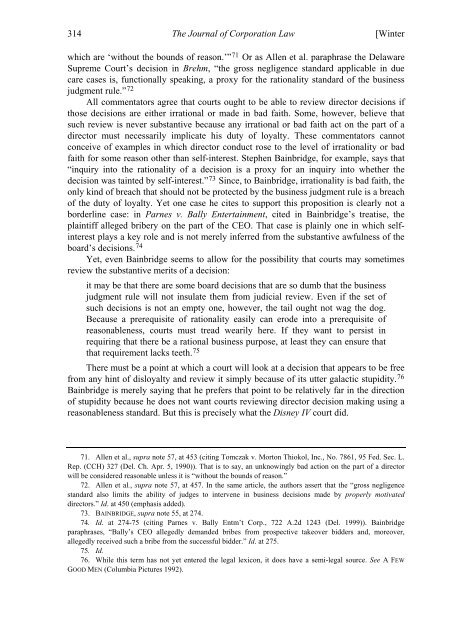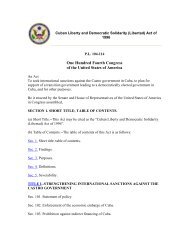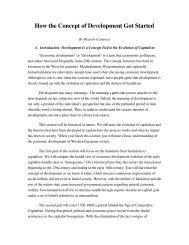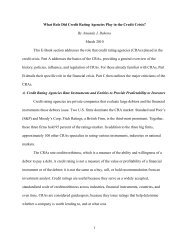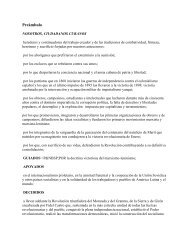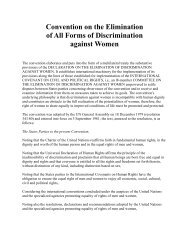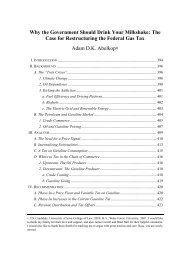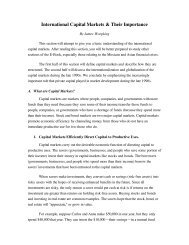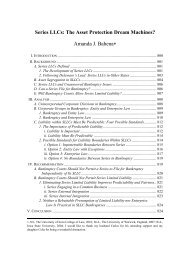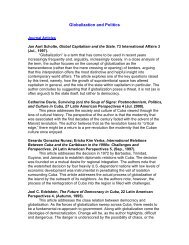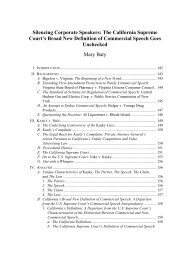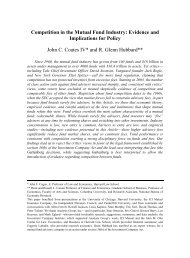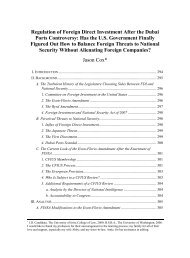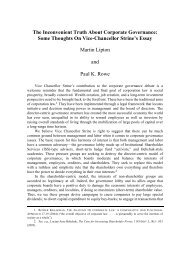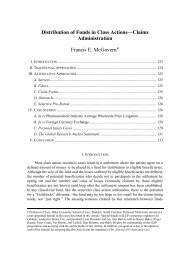Galactic Stupidity and the Business Judgment Rule - College of Law
Galactic Stupidity and the Business Judgment Rule - College of Law
Galactic Stupidity and the Business Judgment Rule - College of Law
You also want an ePaper? Increase the reach of your titles
YUMPU automatically turns print PDFs into web optimized ePapers that Google loves.
314 The Journal <strong>of</strong> Corporation <strong>Law</strong> [Winter<br />
which are ‘without <strong>the</strong> bounds <strong>of</strong> reason.’” 71 Or as Allen et al. paraphrase <strong>the</strong> Delaware<br />
Supreme Court’s decision in Brehm, “<strong>the</strong> gross negligence st<strong>and</strong>ard applicable in due<br />
care cases is, functionally speaking, a proxy for <strong>the</strong> rationality st<strong>and</strong>ard <strong>of</strong> <strong>the</strong> business<br />
judgment rule.” 72<br />
All commentators agree that courts ought to be able to review director decisions if<br />
those decisions are ei<strong>the</strong>r irrational or made in bad faith. Some, however, believe that<br />
such review is never substantive because any irrational or bad faith act on <strong>the</strong> part <strong>of</strong> a<br />
director must necessarily implicate his duty <strong>of</strong> loyalty. These commentators cannot<br />
conceive <strong>of</strong> examples in which director conduct rose to <strong>the</strong> level <strong>of</strong> irrationality or bad<br />
faith for some reason o<strong>the</strong>r than self-interest. Stephen Bainbridge, for example, says that<br />
“inquiry into <strong>the</strong> rationality <strong>of</strong> a decision is a proxy for an inquiry into whe<strong>the</strong>r <strong>the</strong><br />
decision was tainted by self-interest.” 73 Since, to Bainbridge, irrationality is bad faith, <strong>the</strong><br />
only kind <strong>of</strong> breach that should not be protected by <strong>the</strong> business judgment rule is a breach<br />
<strong>of</strong> <strong>the</strong> duty <strong>of</strong> loyalty. Yet one case he cites to support this proposition is clearly not a<br />
borderline case: in Parnes v. Bally Entertainment, cited in Bainbridge’s treatise, <strong>the</strong><br />
plaintiff alleged bribery on <strong>the</strong> part <strong>of</strong> <strong>the</strong> CEO. That case is plainly one in which selfinterest<br />
plays a key role <strong>and</strong> is not merely inferred from <strong>the</strong> substantive awfulness <strong>of</strong> <strong>the</strong><br />
board’s decisions. 74<br />
Yet, even Bainbridge seems to allow for <strong>the</strong> possibility that courts may sometimes<br />
review <strong>the</strong> substantive merits <strong>of</strong> a decision:<br />
it may be that <strong>the</strong>re are some board decisions that are so dumb that <strong>the</strong> business<br />
judgment rule will not insulate <strong>the</strong>m from judicial review. Even if <strong>the</strong> set <strong>of</strong><br />
such decisions is not an empty one, however, <strong>the</strong> tail ought not wag <strong>the</strong> dog.<br />
Because a prerequisite <strong>of</strong> rationality easily can erode into a prerequisite <strong>of</strong><br />
reasonableness, courts must tread wearily here. If <strong>the</strong>y want to persist in<br />
requiring that <strong>the</strong>re be a rational business purpose, at least <strong>the</strong>y can ensure that<br />
that requirement lacks teeth. 75<br />
There must be a point at which a court will look at a decision that appears to be free<br />
from any hint <strong>of</strong> disloyalty <strong>and</strong> review it simply because <strong>of</strong> its utter galactic stupidity. 76<br />
Bainbridge is merely saying that he prefers that point to be relatively far in <strong>the</strong> direction<br />
<strong>of</strong> stupidity because he does not want courts reviewing director decision making using a<br />
reasonableness st<strong>and</strong>ard. But this is precisely what <strong>the</strong> Disney IV court did.<br />
71. Allen et al., supra note 57, at 453 (citing Tomczak v. Morton Thiokol, Inc., No. 7861, 95 Fed. Sec. L.<br />
Rep. (CCH) 327 (Del. Ch. Apr. 5, 1990)). That is to say, an unknowingly bad action on <strong>the</strong> part <strong>of</strong> a director<br />
will be considered reasonable unless it is “without <strong>the</strong> bounds <strong>of</strong> reason.”<br />
72. Allen et al., supra note 57, at 457. In <strong>the</strong> same article, <strong>the</strong> authors assert that <strong>the</strong> “gross negligence<br />
st<strong>and</strong>ard also limits <strong>the</strong> ability <strong>of</strong> judges to intervene in business decisions made by properly motivated<br />
directors.” Id. at 450 (emphasis added).<br />
73. BAINBRIDGE, supra note 55, at 274.<br />
74. Id. at 274-75 (citing Parnes v. Bally Entm’t Corp., 722 A.2d 1243 (Del. 1999)). Bainbridge<br />
paraphrases, “Bally’s CEO allegedly dem<strong>and</strong>ed bribes from prospective takeover bidders <strong>and</strong>, moreover,<br />
allegedly received such a bribe from <strong>the</strong> successful bidder.” Id. at 275.<br />
75. Id.<br />
76. While this term has not yet entered <strong>the</strong> legal lexicon, it does have a semi-legal source. See A FEW<br />
GOOD MEN (Columbia Pictures 1992).


